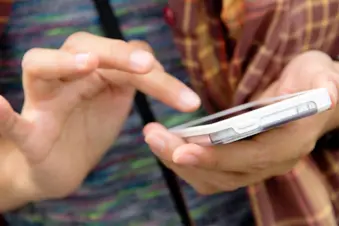
As a dietitian at Yale-New Haven Hospital, Ilisa Nussbaum worked on the front lines of the pandemic in the spring of 2020. One of her responsibilities was to make sure patients on ventilators with COVID-19 got their nutritional needs met. She quickly realized she needed psychological support to help her get through this tough time.
"I became paralyzed by fear over things that should be relatively nonfrightening, like walking by a railing at work that overlooked an atrium," she recalls. But all the local therapists she contacted were so busy they weren't taking on new clients.
One evening while scrolling through Facebook, Nussbaum saw an ad for a mental health app. It was a talk therapy chatbot that helps users monitor their mood. "A little robot asked me questions and sent me articles and videos on how to cope with my feelings during the pandemic," she says. "I found it very useful, especially when I felt overwhelmed and helpless."
Research shows that the app she tried can indeed be effective. When young adults aged 18-28 used it daily for 2 weeks, they experienced more than a 20% reduction in depression symptoms compared with a control group, according to a 2017 study in JMIR Mental Health.
As the COVID-19 pandemic persists, stories like Nussbaum's are becoming more common. An October 2021 study in the Lancet found that almost a third of U.S. adults had symptoms of depression in 2021, compared with 27.8% of adults in the early months of the pandemic in 2020 and 8.5% before the pandemic. As a result, online therapy platforms that connect users to a mental health professional with the click of a button, as well as mental health apps, are in high demand.
The Pros and Cons
With anxiety and depression skyrocketing, and in-person therapists in short supply, there are many reasons people may find it appealing to air their woes to a therapist from the comfort of their own couch.
"Online platforms offer easy entrée, and they're often more affordable than traditional therapy," says Lynn Bufka, PhD, senior director of practice transformation and quality at the American Psychological Association.
Research supports online therapy, too. A 2018 analysis of 20 studies compared the effectiveness of online and face-to-face cognitive behavior therapy. This type of therapy helps patients change their negative thoughts and feelings. The study concluded that online cognitive therapy was just as effective as the in-person version for treating anxiety and depression.
There may be even more value in online therapy during the COVID-19 pandemic because you don't have to take precautions such as wearing a mask during sessions, says Judson Brewer, MD, PhD, director of research and innovation at the Mindfulness Center at the Brown University School of Public Health in Providence, RI.
"You can see one another face-to-face, which is really important for therapists since 70-80% of all communication happens nonverbally," he says. "I can see a patient's facial expressions, which helps me better gauge their feelings."
The bigger concern with online therapy is whether it can provide enough support for people going through moderate to severe depression, Bufka says. "If someone is going through a mental health crisis, my concern is that an online therapist won't be able to intervene and get them to local resources that can provide emergency help," she says.
Experts are more lukewarm about online text therapy, where you message your therapist in a secure chat window on your phone and they respond. "Emojis are a very weak substitute for body language and facial expression," says Brewer, who notes that there's very little research on this type of communication. This format may be good for someone with very mild depression, or suffering from a temporary bout of stress or anxiety, to test the waters, says Ashley Zucker, MD, chief of psychiatry, Kaiser Permanente in San Bernardino County, Southern California.
Nussbaum feels the same way about the automated app that she used. While she feels that right now it's enough to get her through the stresses of the pandemic, she cautions that it's not for everyone.
"I view the ... app as a stopgap for someone with depression and anxiety until they're able to get into therapy, or as an adjunct for someone currently in therapy," she says. "If you have something specific that is upsetting you, ultimately you want to talk to a person, not a robot."
Find the Right App for You
If you are considering an online therapy or a mental health app, Bufka says, ask the following questions:
Is the therapist licensed in your state? "This does a few things: it demonstrates that the provider has met the minimum level of training, is in good standing, and gives you protection to file a grievance if things don't get well," Bufka explains.
Is the platform HIPPA compliant? All licensed therapists need to abide by patient confidentiality rules, whether therapy happens in person or online, Bufka says. Their site should say, under the privacy notice, that they use encrypted web-based platforms that are compatible with the Health Insurance Portability and Accountability Act. Some sites also have a "Shred" button next to each text message so you can delete your message history.
Is there research behind it? This is especially important for mental health apps, since "anyone can put one up on the app store," Brewer says. Check the app's website to see whether it has any published research behind it or was developed by someone at a major university.
Ultimately, online therapy and apps can be a part of your overall self-care. "One of the best things about the app I used was that it required my full attention -- I couldn't look at it while I made dinner or was on my exercise bike," Nussbaum says. "Just the act of sitting down to focus on it helped my mind stop racing. It encouraged me to relax, take some deep breaths, and cultivate mindfulness -- all of which are so important."
Show Sources
Photo Credit: ponsulak / Getty Images
SOURCES:
Ilisa Nussbaum, MPH, RD, Weston, CT.
Lynn Bufka, PhD, senior director of practice transformation and quality, American Psychological Association.
Judson Brewer, MD, PhD, director of research and innovation, Mindfulness Center, Brown University School of Public Health in Providence, RI.
Ashley Zucker, MD, chief of psychiatry, Kaiser Permanente, San Bernardino County, Southern California.
JMIR Mental Health: "Delivering Cognitive Behavior Therapy to Young Adults With Symptoms of Depression and Anxiety Using a Fully Automated Conversational Agent (Woebot): A Randomized Controlled Trial."
The Lancet Regional Health: "Persistent depressive symptoms during COVID-19: a national, population-representative, longitudinal study of U.S. adults."
Cognitive Behaviour Therapy: "Internet-based vs. face-to-face cognitive behavior therapy for psychiatric and somatic disorders: an updated systematic review and meta-analysis."
